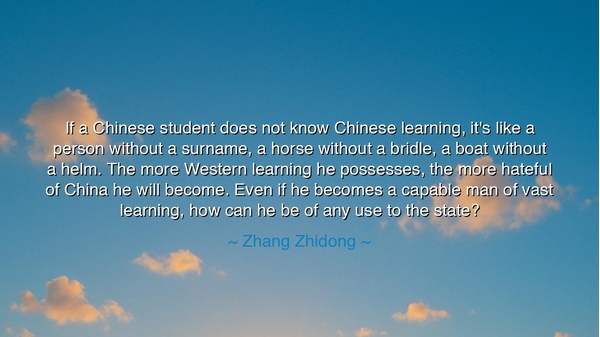
If a Chinese student does not know Chinese learning, it's like a
If a Chinese student does not know Chinese learning, it's like a person without a surname, a horse without a bridle, a boat without a helm. The more Western learning he possesses, the more hateful of China he will become. Even if he becomes a capable man of vast learning, how can he be of any use to the state?






In the solemn and timeless words of Zhang Zhidong, one of China’s great reformist scholars of the late Qing Dynasty, we find a truth that echoes across the centuries: “If a Chinese student does not know Chinese learning, it's like a person without a surname, a horse without a bridle, a boat without a helm. The more Western learning he possesses, the more hateful of China he will become. Even if he becomes a capable man of vast learning, how can he be of any use to the state?” This is not merely a reflection on education; it is a meditation on identity, rootedness, and the balance between tradition and innovation. It is the cry of a man who stood at the crossroads of an empire — watching his nation wrestle between the wisdom of its ancestors and the seduction of foreign power.
To understand Zhang Zhidong’s words, one must recall his time. The late 19th century was an age of turmoil for China — invaded by Western powers, humiliated in war, and shaken by internal decay. The empire’s scholars, once the guardians of Confucian virtue, found their classical knowledge powerless against the cannons of the West. Amid this crisis, Zhang, a reformer both loyal and cautious, sought harmony between two worlds. He advocated what he called “Chinese learning as the essence, Western learning for practical use” (中学为体, 西学为用). His warning was not against knowledge itself, but against the loss of cultural soul. He feared that without a firm root in Chinese learning — the moral and philosophical foundation of the nation — even the brightest students would drift like boats without a helm, driven by foreign winds.
The metaphors in his quote are as vivid as they are wise. A person without a surname is one who has lost his lineage, his belonging, and thus his place in the tapestry of humanity. A horse without a bridle is strong but wild, driven by instinct and chaos. A boat without a helm is at the mercy of the currents, no matter how grand its sails. In these images, Zhang warns of the danger of intellect without identity, knowledge without virtue, and progress without moral direction. The student who masters Western science but forgets the spirit of his own civilization becomes, in Zhang’s eyes, a weapon without purpose — powerful, but perilous.
Yet, Zhang was not blind to the brilliance of Western learning. He admired its technology, its logic, its systems of governance — but he saw them as tools, not truths. For him, Chinese learning — drawn from Confucian ethics, Daoist balance, and centuries of moral reflection — was the essence that gave meaning to all else. Without it, the pursuit of Western skill risked creating men of intelligence but no wisdom, progress without humanity, and nations of wealth but no virtue. His vision was not to reject the modern, but to anchor it in the moral soil of the ancient — to let China modernize without losing its heart.
History has proven Zhang’s foresight both prophetic and poignant. In the decades that followed his death, China was torn between those who sought to rebuild her with Western ideas alone and those who clung blindly to the past. Both extremes led to suffering — for without balance, knowledge becomes arrogance, and tradition becomes stagnation. The true strength of a nation, as Zhang taught, lies in synthesis, not in submission. When learning serves virtue, knowledge uplifts; but when learning forgets its roots, it devours the very soul that created it.
Consider also the story of Japan’s Meiji Restoration, a neighboring nation that embraced Western science while maintaining its spiritual and cultural core. Japan’s leaders studied the West, yet they carried within them the discipline and loyalty born from their own traditions. They rose swiftly in power because they understood what Zhang implored — that a people must learn outwardly, but live inwardly, drawing strength from the foundation of their heritage. A tree that grows without roots may sprout high, but it will topple in the storm. A nation that learns without soul may rise swiftly, but it will fall when tested by time.
Thus, Zhang Zhidong’s words are not relics of a bygone empire, but eternal counsel for all civilizations. In every age, the young are tempted to discard the old, and the nations of the world chase the mirage of progress without wisdom. But the ancients teach us this: to move forward, one must first remember where one stands. True learning is not the gathering of ideas, but the cultivation of balance between the heart and the mind, between one’s own heritage and the knowledge of others.
Let this be the teaching carried forward: Know deeply your roots, but do not fear the winds of change. For the man who knows who he is can walk among all nations without losing his soul, while the one who forgets his origins becomes a stranger even to himself. Learning without identity is brilliance without direction, and nations that forget their essence, like boats without a helm, drift into the sea of oblivion. Let us learn, then, as Zhang Zhidong urged — not to become Western or Eastern, ancient or modern, but to become whole: grounded in wisdom, open in mind, and steadfast in spirit.






AAdministratorAdministrator
Welcome, honored guests. Please leave a comment, we will respond soon